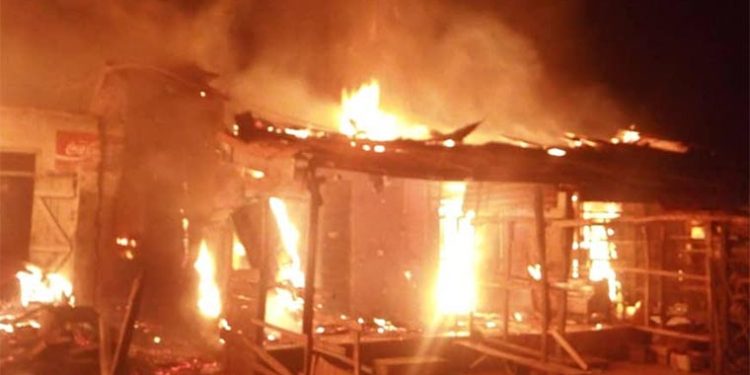Deadly fire outbreaks at markets are making Nigerian traders miserable. Seven days ago, traders at the Ladipo and Owode-Onirin markets in Lagos State suffered losses following fire outbreaks. Recurring fires in markets across Nigeria have been a matter of concern. As the preventive measures are still low, more fire incidents are still possible.
Various factors have been blamed for the fires. They range from power surges to dry weather conditions, careless handling of wares to the packaging of combustible items, and petrol storage inside shops to the haphazard shop design.
Markets lack fire extinguishers, hydrants, and water stations. The late fire service’s reaction, unsafe sanitary conditions, and disdain for insurance subscriptions are other major issues.
In some instances, the packed nature of markets and the hostile response of traders and residents during fire outbreaks have prevented fire service trucks from accessing burning shops.
Regulatory failures, ignorance of fire prevention protocols, poor electrical wiring, overcrowded market spaces, illegal structures, lack of fire extinguishers, and inadequate awareness campaigns on fire safety compound the menace.
The Ladipo incident was traced to a power surge after electricity was restored. A fire outbreak at the Ladipo Plank Market in November 2023 damaged 351 shops.
In 2024, Nigeria witnessed market fires at the Mandilas Building in Lagos, Masaka (Nasarawa), Leventis (Yobe), Dosunmu (Lagos) and Karu (Abuja). In 2020, a fire pulverised 91 shops at the Cairo Market in Oshodi, Lagos. Lagos records the highest number of fires, followed by Anambra.
Between 2019 and 2021, Nigeria recorded 79 deaths in 68 fire incidents and fire officials received 4,541 calls between 2020 and 2021.
The financial cost tallied N41.54 billion in 2020 and 2021 with little mitigation for the victims. However, the Kastina State Government shared N247 million to the 680 victims of the Katsina Central Market outbreak in 2021.
Without succour, many traders have reportedly lost their sanity, taken their lives, or had to relocate to their hometowns in abject penury. The trauma for those trading with funds borrowed at cut-throat interest rates is unquantifiable.
There have been allegations that some of these fires were caused by state governments in a desperate bid to reclaim markets from traders and hand them over to developers for transformation into expensive plazas.
Therefore, governments should match their revenue drive from markets with commensurate action against constant fire threats. Governments should sanction violators of safety protocols and those responsible for the illegal expansion of markets.
Shops should obtain fire extinguishers and set up rescue teams within these market associations. Restaurants and gas cylinders should be in safe areas away from congested spots. These food vendors must be mandated to acquire fire extinguishers and other safety equipment.
Traders should be trained in fire prevention strategies and conscious efforts made for the provision of water.
Municipal authorities should create safe market spaces and take decisive action against illegal electrical connections.
Market unions should imbibe health and safety practices and sensitise their members on the insurance of their goods.
The stocking and display of goods in markets must be based on compatibility to prevent threats from one shop to another.
State and local governments should build more markets and invest in market infrastructure. Improvements to building designs and the inclusion of fire exits are necessary.
When appliances are not in use, traders should disconnect them.
Trained LG/state officials should ensure traders respect environmental and safety guidelines. Governments need to be proactive in preventing fires in the markets.
















































